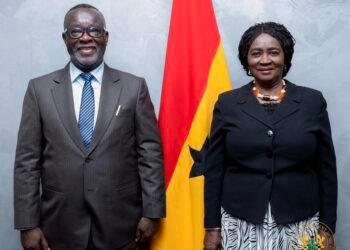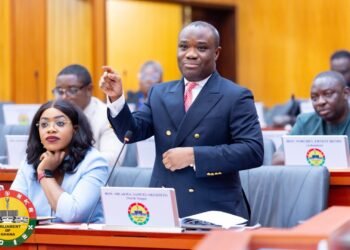The MP for Bolgatanga Central Constituency Hon. Isaac Adongo has Clarified the NDC policy on the 24-hour economy and Mahama Social Contract with Ghanaians.
Hon. Adongo emphasized the need to transform Ghana’s agriculture sector as a key pillar in addressing the country’s economic challenges, particularly foreign exchange and the rising demand for imported food products.
Hon. Adongo outlined the NDC’s strategy to promote local food production, with a focus on rice cultivation, which he sees as a critical area for reducing the pressure on the Ghanaian cedi due to high foreign exchange demands for imports.
“We have told you how we are going to transform agriculture to produce our food.”
Hon. Isaac Adongo the MP for Bolgatanga Central Constituency
Hon. Adongo highlighted an initiative at Yagba Kubori, where youth involvement in agriculture is being bolstered by government-supported services. Hon. Adongo believes this will lead to a significant increase in rice production, ultimately reducing the country’s dependency on imported rice. By producing enough rice locally, Adongo suggests that “the pressure on the city resulting from the excessive demand of forex to buy rice won’t come in.”
A 24-Hour Economy and Import Substitution
This approach to agricultural transformation is part of a broader strategy the NDC intends to implement, which includes adopting a “24-hour economy.”
Hon. Adongo described this as a plan to increase the country’s output exponentially by focusing on import substitution. He argues that by combining agricultural self-sufficiency with an intensified production strategy, the government could address a large portion of its foreign exchange issues.
“…So, if you put these two together, you are already dealing with about 60 to 70% of our forex problem.”
Hon. Isaac Adongo the MP for Bolgatanga Central Constituency
Criticism of the Gold-for-Oil Policy
Moreover, Hon. Adongo criticized the current government’s Gold-for-Oil policy, describing it as ill-conceived and lacking transparency.
Hon. Adongo expressed particular concern about the lack of a formal agreement governing this policy, pointing out that the International Monetary Fund (IMF) had advised against its continuation.
“Somebody has no idea, he’s talking about gold for oil, gold for oil. A policy that the IMF, you have signed on to ellipses that you are abolishing.”
Hon. Isaac Adongo the MP for Bolgatanga Central Constituency
Moreover, Adongo’s sharp critique extends to the future of the Gold-for-Oil policy under an NDC government, asserting that it would not only be discontinued but also investigated. Hon. Adongo noted that this commitment to investigation is part of the NDC’s manifesto, reflecting the party’s stance on issues of transparency and accountability.
“We are not only stopping it. It is part of our manifesto promise, we are investigating [what] the auditor general says that they did not find any agreement covering this gold for oil arrangement.”
Hon. Isaac Adongo the MP for Bolgatanga Central Constituency
Transparency and National Vulnerability
The absence of a formal agreement is deeply troubling to Adongo, who questions the entire structure of the policy. Hon. Adongo described a scenario where gold is collected by the Bank of Ghana for oil purchases, but with little oversight or assurance that the transactions are being properly handled.
“What it means is that you have people who just go to Bank of Ghana, take gold, they go to buy oil, whether they bring the oil or not, we don’t know.”
Hon. Isaac Adongo the MP for Bolgatanga Central Constituency
According to Hon. Adongo, this lack of transparency and accountability leaves the country vulnerable to significant losses. Without any guarantee that Ghana could recover its money if the deals fall through, he sees the policy as a “scam” designed to benefit a few at the expense of the nation.
“We don’t have any guarantee that if something goes bad, we will get our money back and you think that we should continue this scam? This loot and share?”
Hon. Isaac Adongo the MP for Bolgatanga Central Constituency
Hon. Adongo’s statement underscored a broader criticism of the government’s handling of economic policies. Hon. Adongo’s focus on agricultural transformation as a solution contrasts sharply with what he perceives as reckless and untransparent financial dealings.
Hon. Adongo’s call for an investigation into the Gold-for-Oil policy indicates the NDC’s commitment to ensuring that public resources are managed responsibly and that policies are designed to benefit the entire population rather than a select few.
Hon.Adongo’s remarks reflect the NDC vision of a Ghana that is more self-reliant in food production, reducing the need for costly imports and strengthening the economy. Hon. Adongo’s criticism of the Gold-for-Oil policy also highlights his broader concerns about transparency and good governance, which he believes are necessary to ensure the country’s economic stability.
The NDC’s plan to transform agriculture and implement a 24-hour economy is presented as a viable alternative to the current administration’s approach, which Adongo believes has failed to address the underlying issues facing the country.
READ ALSO; Kidi Hints Hip-hop Collaboration With Black Sherif After ‘Lomo Lomo























